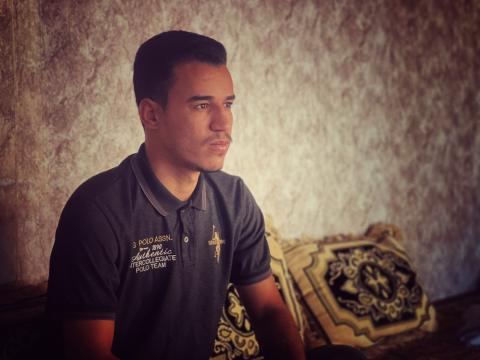From Doubt to Advocacy: Shakir’s Journey of Empowerment in Ba’aj

In the remote town of Ba’aj, nestled far from the governorate’s reach in Ninewa, 25-year-old Shakir has spent his life grappling with daily hardship. Born and raised in a place where clean water and electricity are scarce and job opportunities even rarer, he—like many others—worked as a labourer, struggling to meet basic needs.
"In Ba’aj, there is no reliable access to water or electricity," Shakir explains. "Every 10 days, each neighbourhood of about 200 people depends on three to four water tankers, which we have to purchase for 4,000 Iraqi dinars (about 3.07 USD). Sometimes we have electricity for just three or four hours a day - sometimes not at all."
But the challenges go beyond water and electricity. With unemployment soaring to 80%, most residents rely on agriculture and daily labour, both of which are increasingly impacted by climate change. Limited infrastructure, dependence on costly local generators, and a lack of sustainable income have left the people of Ba’aj in a cycle of poverty and uncertainty.
At first, Shakir was skeptical when World Vision Iraq offered an advocacy training in his area. "I didn’t believe it could bring change," he admits. "But I joined the session after encouragement from local volunteers - and it turned out to be like a real school. We learned so much."
In just two days, Shakir and other young participants were introduced to the concept of advocacy - a term he had never encountered before. Facilitated by World Vision Iraq’s team, including community mobiliser Bassam, the sessions included group discussions and hands-on exercises. "We learned the difference between positive and negative advocacy, how to raise our voices, and how to organise around shared problems," Shakir recalls.
The training sparked something in him.
Shakir began encouraging other youth in his neighbourhood to participate. "I told them, advocacy is benefiting us. It’s not just talk - we’re seeing changes." Awareness among youth in Ba’aj began to grow. They reached out to local media and used platforms like Facebook to voice the community’s concerns. "For the first time, our voices were heard," he says proudly. "We spoke about the water and electricity issues, and we started to see small but real improvements."
In the past, families in Shakir’s neighbourhood were paying 5,000 Iraqi dinars (about 3.83 USD) per water tanker. After their advocacy efforts, the cost was reduced to 4,000 dinars (3.07 USD) - a small but important win for struggling families.
More than just knowledge, the training gave Shakir confidence. "Standing up and explaining my community’s challenges in front of others — that was a powerful moment for me. It made me feel like I had a role to play. Our ideas became stronger, and we grew as a group."
What started as hesitation has now turned into leadership. Today, Shakir is a vocal advocate for his community, inspiring his peers and calling for continued support. "I hope to keep participating. If not for this training, we wouldn’t have reached out to the media or shared our issues publicly. It made an extraordinary difference."
"Shakir’s transformation from skepticism to civic leadership illustrates the critical importance of inter-agency investment in grassroots advocacy. In marginalised areas like Ba’aj, where governance gaps and climate stressors intersect, civic engagement becomes not just a right but a necessity for survival. By creating space for young people to learn, organise, and influence decision-making, we’re not only amplifying their voices, we’re reinforcing the social fabric needed for inclusive recovery." said Linda Rashid, World Vision Iraq’s Technical Advisor for Peace-building and Inclusion.
Shakir’s journey shows that even in the most remote areas, meaningful change can begin with awareness - and that empowering one young person can inspire an entire community.
Through this awareness-raising and advocacy training programme, World Vision Iraq, through its Nexus Accelerator Fund — a project under the umbrella of Recovery and Resilient Pathways for Iraq - has trained 159 (94 female, 65 male) youth aged 21–29 years old like Shakir in Ba’aj and Sinjar on advocacy and peace-building concepts. This multi-agency partnership, launched in 2024 by eight local and international organisations in Iraq, equips young people with the knowledge and tools to advocate for their rights, take ownership of their communities, and work collectively towards lasting solutions.
The Project Manager for the Nexus Accelerator Fund, Afnan Jarjees, said, "At World Vision Iraq, under the Nexus Accelerator Fund project, we are investing in and empowering youth through advocacy and peace-building. We are planting seeds of conflict resolution, peaceful living, and coexistence. The young participants from Sinjar and Ba’aj - areas that have long suffered from conflict - are gaining the skills to nurture these seeds and create a change. Investing in these youth means enabling them to raise their voices and shape a brighter and safer future for their communities and future generations. When youth lead with empathy and purpose, they become powerful agents of hope and prosperity."